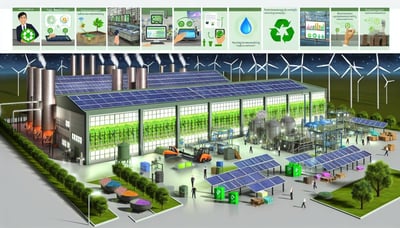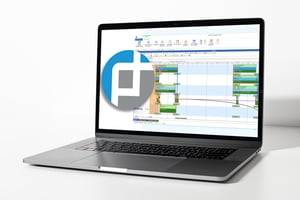The Intersection of Green Manufacturing Initiatives and Scheduling
Manufacturing facilities are under increasing pressure to not only optimize production processes but also to do so in an environmentally sustainable manner. The concept of green manufacturing has gained significant traction in recent years as businesses seek to minimize their ecological footprint while maximizing operational efficiency.
At the heart of this endeavor lies the need for efficient scheduling systems that can seamlessly integrate with enterprise resource planning (ERP), supply chain management (SCM), and manufacturing execution systems (MES).
In this blog, we will explore the intersection of green manufacturing initiatives and scheduling, focusing on how integration between PlanetTogether and leading ERP, SCM, and MES systems can drive sustainability and productivity in industrial manufacturing facilities.

Green Manufacturing Initiatives
Green manufacturing, also known as sustainable manufacturing, refers to the practice of producing goods in a manner that minimizes resource consumption, waste generation, and environmental impact. This holistic approach encompasses various strategies, including energy efficiency improvements, waste reduction, use of renewable resources, and adoption of eco-friendly technologies. By embracing green manufacturing initiatives, businesses can not only reduce their environmental footprint but also achieve cost savings, enhance brand reputation, and comply with regulatory requirements.
Challenges in Scheduling for Green Manufacturing
One of the key challenges in implementing green manufacturing initiatives lies in optimizing production schedules to minimize energy consumption, reduce waste, and maximize resource utilization. Traditional scheduling approaches often prioritize throughput and cost efficiency without considering environmental factors. As a result, manufacturing facilities may operate inefficiently, leading to excessive energy usage, material waste, and emissions.

Integrating PlanetTogether with ERP, SCM, and MES Systems
To address these challenges, industrial manufacturing facilities can leverage advanced scheduling solutions such as PlanetTogether, which offers robust capabilities for production planning, scheduling, and optimization. By integrating PlanetTogether with leading ERP, SCM, and MES systems such as SAP, Oracle, Microsoft, Kinaxis, and Aveva, businesses can create a seamless data ecosystem that enables real-time visibility, collaboration, and decision-making across the entire value chain.
Benefits of Integration
The integration between PlanetTogether and ERP, SCM, and MES systems unlocks a myriad of benefits for manufacturing facilities seeking to embrace green manufacturing initiatives:
Enhanced Visibility: Integration provides real-time access to critical data, including inventory levels, production orders, resource availability, and environmental metrics. This visibility enables stakeholders to make informed decisions and proactively address issues that may impact sustainability goals.
Optimized Resource Utilization: By synchronizing production schedules with demand forecasts, inventory levels, and resource capacities, businesses can minimize idle time, reduce energy consumption, and optimize the use of raw materials and equipment.
Reduced Waste and Emissions: Advanced scheduling algorithms consider environmental constraints such as energy usage, emissions targets, and waste generation limits. By optimizing production sequences and batch sizes, manufacturing facilities can minimize waste generation, emissions, and environmental impact.
Compliance Management: Integration with ERP and MES systems facilitates compliance management by automating data capture, documentation, and reporting processes. This ensures adherence to regulatory requirements related to environmental permits, emissions monitoring, and sustainability certifications.
Continuous Improvement: Integrated scheduling systems enable continuous monitoring and analysis of key performance indicators (KPIs) related to sustainability metrics. By leveraging analytics and predictive modeling, businesses can identify optimization opportunities, implement corrective actions, and drive continuous improvement in environmental performance.
The integration between PlanetTogether and leading ERP, SCM, and MES systems plays a crucial role in driving green manufacturing initiatives in industrial facilities. By optimizing production schedules, minimizing waste, and reducing environmental impact, businesses can achieve sustainability goals while enhancing operational efficiency and competitiveness.
As we look to the future, it is imperative for manufacturing organizations to prioritize sustainability and embrace innovative technologies that enable environmentally responsible production practices. By leveraging advanced scheduling solutions and seamless integration with enterprise systems, industrial facilities can pave the way towards a greener, more sustainable future.
Are you ready to take your manufacturing operations to the next level? Contact us today to learn more about how PlanetTogether can help you achieve your goals and drive success in your industry.

